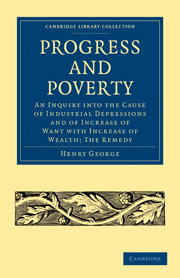 Progress and Poverty
Progress and Poverty Book contents
- Frontmatter
- PREFACE TO FOURTH EDITION
- Contents
- INTRODUCTORY
- BOOK I WAGES AND CAPITAL
- BOOK II POPULATION AND SUBSISTENCE
- BOOK III THE LAWS OF DISTRIBUTION
- Chapter I The inquiry narrowed to the laws of distribution—necessary relation of these laws
- Chapter II Rent and the law of rent
- Chapter III Interest and the cause of interest
- Chapter IV Of spurious capital and of profits often mistaken for interest
- Chapter V The law of interest
- Chapter VI Wages and the law of wages
- Chapter VII Correlation and co-ordination of these laws
- Chapter VIII The statics of the problem thus explained
- BOOK IV EFFECT OF MATERIAL PROGRESS UPON THE DISTRIBUTION OF WEALTH
- BOOK V THE PROBLEM SOLVED
- BOOK VI THE REMEDY
- BOOK VII JUSTICE OF THE REMEDY
- BOOK VIII APPLICATION OF THE REMEDY
- BOOK IX EFFECTS OF THE REMEDY
- BOOK X THE LAW OF HUMAN PROGRESS
- CONCLUSION
- INDEX
Chapter II - Rent and the law of rent
Published online by Cambridge University Press: 07 September 2011
- Frontmatter
- PREFACE TO FOURTH EDITION
- Contents
- INTRODUCTORY
- BOOK I WAGES AND CAPITAL
- BOOK II POPULATION AND SUBSISTENCE
- BOOK III THE LAWS OF DISTRIBUTION
- Chapter I The inquiry narrowed to the laws of distribution—necessary relation of these laws
- Chapter II Rent and the law of rent
- Chapter III Interest and the cause of interest
- Chapter IV Of spurious capital and of profits often mistaken for interest
- Chapter V The law of interest
- Chapter VI Wages and the law of wages
- Chapter VII Correlation and co-ordination of these laws
- Chapter VIII The statics of the problem thus explained
- BOOK IV EFFECT OF MATERIAL PROGRESS UPON THE DISTRIBUTION OF WEALTH
- BOOK V THE PROBLEM SOLVED
- BOOK VI THE REMEDY
- BOOK VII JUSTICE OF THE REMEDY
- BOOK VIII APPLICATION OF THE REMEDY
- BOOK IX EFFECTS OF THE REMEDY
- BOOK X THE LAW OF HUMAN PROGRESS
- CONCLUSION
- INDEX
Summary
The term rent, in its economic sense—that is, when used, as I am using it, to distinguish that part of the produce which accrues to the owners of land or other natural capabilities by virtue of their ownership—differs in meaning from the word rent as commonly used. In some respects this economic meaning is narrower than the common meaning; in other respects it is wider.
It is narrower in this: In common speech, we apply the word rent to payments for the use of buildings, machinery, fixtures, etc., as well as to payments for the use of land or other natural capabilities; and in speaking of the rent of a house or the rent of a farm, we do not separate the price for the use of the improvements from the price for the use of the bare land. But in the economic meaning of rent, payments for the use of any of the products of human exertion are excluded, and of the lumped payments for the use of houses, farms, etc., only that part is rent which constitutes the consideration for the use of the land—that part paid for the use of buildings or other improvements being properly interest, as it is a consideration for the use of capital.
- Type
- Chapter
- Information
- Progress and PovertyAn Inquiry into the Cause of Industrial Depressions and of Increase of Want with Increase of Wealth; The Remedy, pp. 148 - 154Publisher: Cambridge University PressPrint publication year: 2009First published in: 1881
